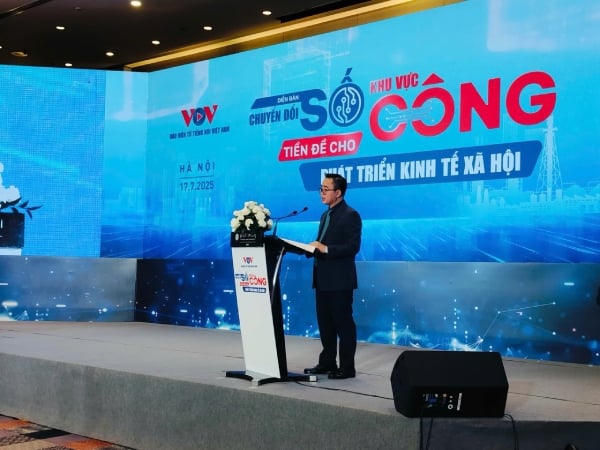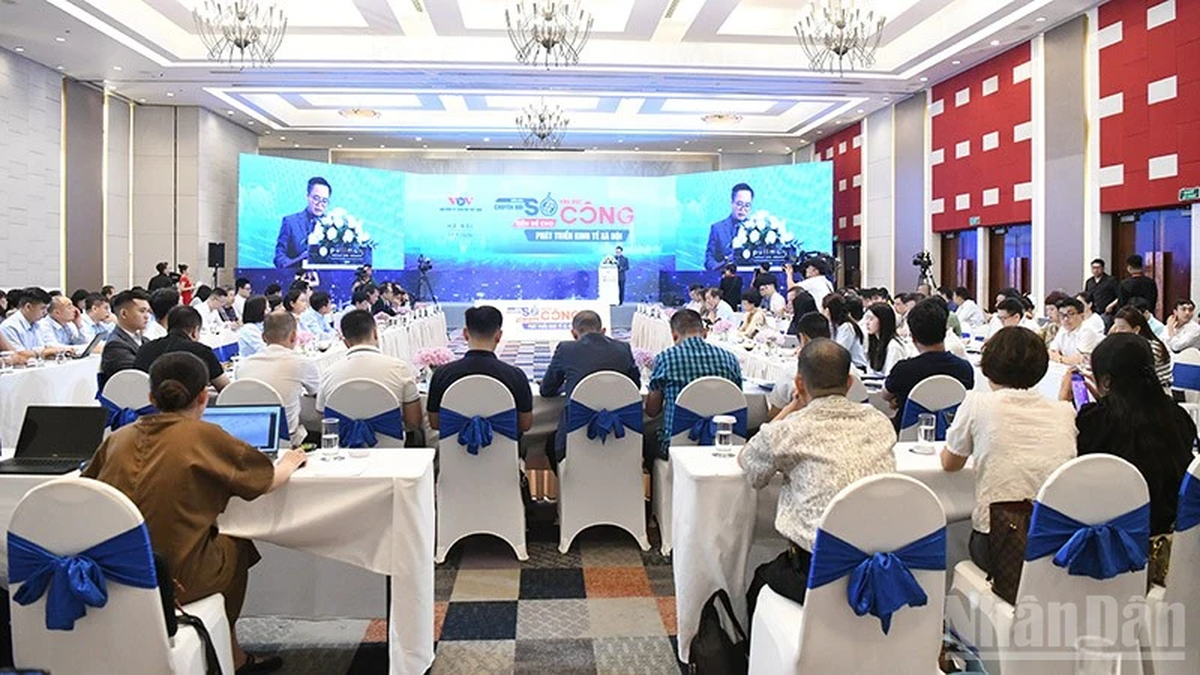Digital transformation is identified as an important driving force for socio -economic development. However, to truly create a breakthrough, it is necessary to overcome many bottlenecks in institutions, infrastructure and effective measurement methods. These are the core issues that experts dissected at the forum "Digital transformation of the public sector - Premise for socio-economic development" on July 17 in Hanoi.
Bottlenecks from infrastructure to thinking
Speaking at the forum, Mr. Pham Manh Hung - Deputy General Director of Voice of Vietnam (VOV) affirmed that digital transformation is taking place strongly and widely in all fields. The application of technology not only optimizes the operations of state agencies but also creates favorable conditions for people and businesses, especially state-owned enterprises, to access public services more quickly and effectively.
However, this process is facing many challenges. Regarding infrastructure, Mr. Nguyen Huu Thai Hoa - Deputy Director of IVM - VUSTA pointed out the lack of synchronization, especially at the grassroots level.
He cited: "When making a household registration, the police issue a QR code, but this code is only valid for 3 months because the committee does not have the synchronous equipment to read the data. This is a huge bottleneck."

In addition, resource constraints are also a significant barrier. We can update technology, but local officials do not know how to use it, leading to equipment being 'shelved'. Along with that is the lack of data connectivity, lack of sharing between ministries and sectors, and a fear of innovation in some places.
Emphasizing the role of the Government in the digital transformation process, Mr. Nguyen Huu Thai Hoa shared that what he expects most is not for the Government to "rush in to compete with businesses for work", but to act as an arbitrator and ensure quality.
"Currently, no one measures the quality of digital transformation or AI. We need clear standards like ISO, and the Government must be the supervisor, we cannot 'play football and blow the whistle at the same time'," Mr. Hoa emphasized.
Agreeing with this view, Associate Professor, Dr. Ngo Tri Long - an economic expert, said that digital transformation will hardly create a breakthrough if it is only considered a purely technological task.
"Only when integrated into the economic-institutional reform process, measured by actual effectiveness, can digital transformation play its role as a 'new growth platform', in accordance with the spirit of Resolution 57 of the Politburo on breakthroughs in science and technology development, innovation and national digital transformation," Mr. Long analyzed.
According to experts, three limitations: no economic measurement mechanism, fragmented and disconnected investment, and culture and institutions that do not support data thinking are hindering the comprehensive and effective development of public sector digital transformation in Vietnam.
Therefore, adding economic quantitative mechanisms, standardizing national data, improving the digital capacity of civil servants and reforming legal institutions will be breakthroughs for Vietnam to realize the goal of building a digital government, digital economy and digital society by 2025 - 2030 in a sustainable, effective and consistent manner with international trends.
The big challenge in measuring digital transformation effectiveness
"How to accurately measure effectiveness" is a big question that experts are particularly interested in. Mr. Chu Duc Hoang - Chief of Office of the National Technology Innovation Fund, said that, in the spirit of Resolution 57, Vietnam is shifting from pre-control to post-control.
"We can invest a lot of money, but if we cannot evaluate the effectiveness, problems will arise. Monitoring and evaluation must be based on actual effectiveness, quantitative data and carried out by an independent organization," said Mr. Hoang.
Although the digital transformation process still has many difficulties and challenges, Mr. Chu Duc Hoang is still optimistic: "There are efforts whose results are not yet seen, but that is the foundation for other achievements to sprout."
Sharing lessons from Rwanda, Mr. Nguyen Minh Khoi - Director of Policy & Transformation at the Tony Blair Institute said that this country has been successful in establishing the position of "Chief Digital Officer" in all agencies, responsible for discipline and application efficiency through a clear "scorecard" system.
"In Vietnam, we have done well at the macro level with the DTI index. Now, we need to focus on the micro level, that is, each agency, perhaps through the development of 'digital handbooks' or 'digital roadmaps' for each unit," Mr. Khoi suggested.
Source: https://doanhnghiepvn.vn/chuyen-doi-so/chuyen-doi-so-chi-dot-pha-khi-duoc-tich-hop-vao-cai-cach-the-che/20250717042118940





































































































Comment (0)